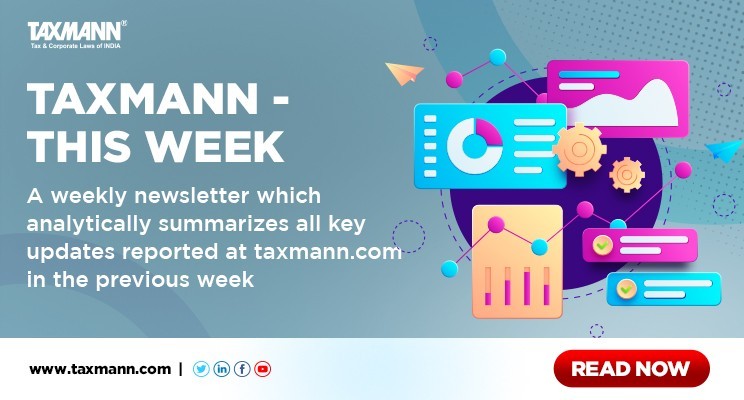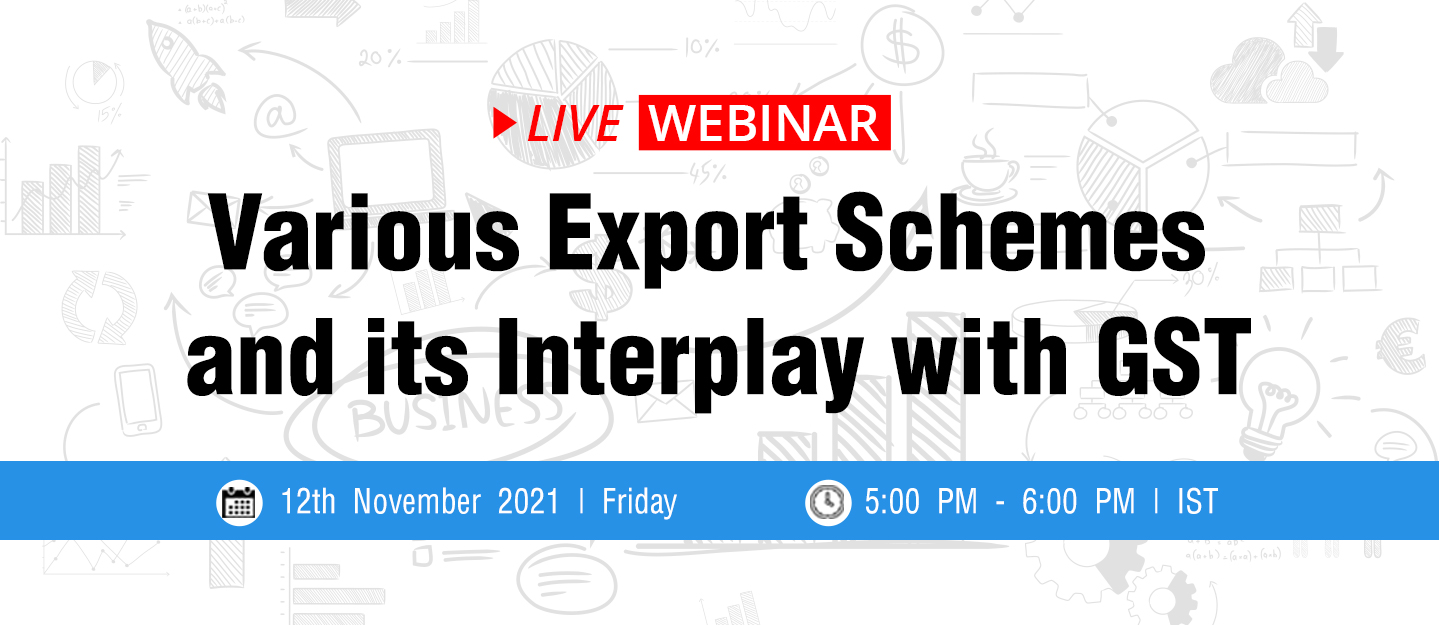Weekly Round-up on Tax and Corporate Laws | 25th to 30th October
- Blog|Weekly Round-up|
- 10 Min Read
- By Taxmann
- |
- Last Updated on 14 December, 2022

This weekly newsletter analytically summarizes the key stories reported at taxmann.com during the previous week from 25th to 30th October 2021, namely:
(b) Permanent transfer of IPRs would be subject to 18% GST;
(f)Zee v. Invesco: Bombay HC restrains Invesco from calling and holding EGM; and
(g)Ind AS 110: Consolidation of Joint Venture where the economic activity that got ceased.
1. Furnishing of written submissions cannot be interpreted that assessee has waived off his right to be heard
The Delhi Tribunal has quashed the argument of revenue that it should be treated that assessee had waived off right to be heard if he has made available written submissions to First Appellate Authority.
Facts
In the instant case, the CIT(A) held that the submissions filed by the assessee were insufficient for warranting relief, and accordingly, the addition made by the AO was to be confirmed.
Aggrieved-assessee filed the appeal before the Delhi Tribunal, contending that the CIT(A) did not afford a reasonable opportunity to furnish documentary evidence and other details as desired necessary by him.
Ruling
The Delhi Tribunal held that if an adjudicating authority finds the written submissions are not sufficient and complete, it should put this deficiency to the notice of the assessee. Without any specific communication to this effect, it cannot be said that an adequate opportunity of being heard has been granted to the assessee.
Once it is seen that the submissions were without supporting documentary evidence, then in an adequate representation, such an opportunity necessarily needs to be provided.
In the instant case, no such effort appeared to have been made. It is well settled that the mere making available of the written submissions by an assessee cannot be unitedly so interpreted to mean that right to be heard has been waived off.
The onus to ensure that the waiver was made with full and conscious knowledge of the existence of this sacrosanct right rests on the shoulders of the adjudicating authority to ensure that the assessee stays informed of his rights and consequent duties. There is nothing on record to show that the First Appellate Authority can be justifiably held to form the view in the facts of the present case that the assessee was so informed of its rights and still chose to waive them.
Read the Ruling
Did you know, that you could order the latest books from Taxmann’s Online Store? Watch the video to find out more!
2. Permanent transfer of IPRs would be subject to 18% GST
Based on the recommendation of the 45th GST Council meeting, the GST rate on the permanent transfer of the Intellectual Property right (IPR), in respect of goods other than IT software, under the service tariff notification was increased from 12% to 18% by Notification No. 06/2021 – Central Tax (Rate) dated 30-09-2021. However, no such amendment was made in the rate notification of goods (as a similar expression was also there). Accordingly, an amendment in the rate notification of goods has been made to provide the GST rate of 18% on the permanent transfer of all IPRs. In this regard, Notification No. 13/2021 – Central Tax (Rate) Dated 27-10-2021 has been issued.
Read the Notification
LIVE Webinar!
Various Export Schemes and its Interplay with GST
12th November 2021| 5:00 PM
Speaker – Mr. S.C. Jain
3. Section 10(23FE) exemption is available only if the source of investment in India is not from any borrowings
Section 10(23FE) provides an exemption to sovereign wealth funds and pension funds (specified fund) on their income like dividend, interest, and long-term capital gains arising from investment in infrastructure in India made between 01-04-2020 and 31-03-2024 subject to fulfillment of certain conditions.
The Finance Act, 2021, inter-alia, inserted the seventh proviso to Section 10(23FE) to provide that if the specified fund has loans or borrowings, directly or indirectly, to invest in India, such fund shall be deemed to be not eligible for exemption.
Concerns have been raised regarding the term ‘indirectly’ as the same has not been defined. There was no clarity that if the specified fund or its holding entity or any other entity in the chain of holding or any associate thereof (group concern) has any loans or borrowings, the specified fund may be ineligible to get the exemption or not?.
To remove such difficulties, the Central Board of Direct Taxes (CBDT) has issued the following clarifications:
(a) If the loans and borrowings have been taken by the specified fund or any of its group concerns, specifically to invest by the specified fund in India, such fund shall not be eligible for exemption; and
(b) If the loans and borrowings have been taken by the specified fund or any of its group concerns, not specifically to invest in India, it shall not be presumed that the investment in India has been made out of such loans and borrowings. Accordingly, such specified fund shall be eligible for exemption under section 10(23FE), subject to the fulfillment of all other conditions. However, the source of the investment in India by such specified fund shall not be from such loans and borrowings.
Read the Circular
The Latest from Taxmann.com!
Your virtual legal advisor that helps you understand complex legal concepts and enables you to give instant & best-in-class advice to your clients
Start your search using keywords or section no. here
4. Siemen’s policy to share passwords of MRI and CT Scan machines after payments of fees isn’t anti-competitive: CCI
In this significant ruling, the CCI held that the Siemen’s policy to share passwords of MRI and CT Scan machines after payments of fees isn’t anti-competitive.
Facts
The informants were engaged in the business of providing diagnostics and pathology lab services to patients in Delhi/NCR. The informants were a customer of Siemens Ltd. for CT and MRI Machine.
The Informants alleged that Siemens Ltd. compelled them to take Comprehensive Maintenance Contract (CMC) by resorting to various means like overcharging for spare parts, not sharing passwords/encryption codes, etc., which were alleged to be in contravention of the provisions of the Act. They also alleged that Siemens Ltd. forced the informants to sign on the dotted lines of the one-sided CMC agreement (in favour of Siemens Ltd.) without any negotiations or alterations.
The informants had alleged that machines were protected by an encryption code, i.e., a password, which Siemens Ltd. did not share with informants. Hence the informants were unable to get the machine serviced from outside.
The informants also submitted that they could not procure optic fiber cable from the open market because a service password was required to replace it, which only Siemens Ltd. could provide.
On the aspect of dominance, the CCI noted that there were big players like GE, Philips having a strong presence in the market of MRI and CT scan machines, and thus, Siemens Ltd. was not in a dominant position.
With respect to the allegation of abuse of dominance, the CCI noted that Siemens Ltd. used to provide passwords against payment of fees. However, informants did not take any steps to obtain the same.
On the allegation of overcharging for an optic fiber cable, it was noted that no password was required to replace the fiber cable, and the informants could have procured a cable from the local markets if it was not satisfied with the price and convinced that the cables available in the local markets were safe.
Further, the CCI observed that the informants had not brought out any evidence to show that Siemens Ltd. created any hurdles even upon the due willingness of the informant for obtaining such passwords after payment of fees.
The CCI held that no prima facie case of contravention of provisions of section 4 was made out against Siemens Ltd. and directed to close the information.
Read the Ruling
Check out Taxmann’s Indian Competition Law, which is a section-wise commentary on Competition Law. What sets this book apart is the unique combination of the study of both substantive and procedural elements of Competition Law in India along with Case Laws from the Indian, EU, UK & USA Courts
Here’s a Sample Chapter for your Reference!
5. Police department providing arms & security guards to PSUs & Govt. dept. not covered under security agency: CESTAT
The CESTAT has recently held that the definition of a security agency would not cover the activity of providing arms and security guards undertaken by the police. The police department is the agency of the State Government and cannot be considered to be a person engaged in the business of running security services. Mumbai Bench of CESTAT gave this ruling in the case of Superintendent of Police (Rural) v. Commissioner of Central Excise, Aurangabad.
Facts
The appellant was a part of the Maharashtra State Police force providing arms, security guards to public sector banks/undertakings and government departments under Section 13 of Police Act, 1861 on a collection of actual expenditure/cost called as consideration under the contract. The department issued an order of demand of service tax on the ground that providing armed security guards to public sector banks/undertakings and government departments would be covered under the definition of ‘security services,’ and collection of charges for the same would be liable to service tax. The appellant filed an appeal against it.
CESTAT
The honorable CESTAT observed that the appellant was performing statutory duties, and the amount so collected would have been deposited in the government treasury.
The CESTAT relied on the CESTAT decision vide Final Order No. 55321-55348 dated 25-11-2016 in the case of Dy. Commissioner of Police & Others v. CCE, Jaipur & Others, where it was concluded that the police department, which is the agency of State Government, cannot be considered a person engaged in the business of running security services. Therefore, it was held that the definition of a security agency would not cover the activity undertaken by the police under section 64(94) of the Finance Act, 1994, and demand was liable to be set aside.
Read the Ruling
Check out Taxmann’s Latest GST Annual Return & Reconciliation. It covers comprehensive analysis in the form of Case Studies, Advanced FAQs, Step-by-Step Guides etc., on Forms 9, 9A & 9C, along with issues relating to Anti-profiteering & policy mismatch in GST & Accounting Standards.
Here’s a Sample Chapter for your Reference!
6. Zee v. Invesco: Bombay HC restrains Invesco from calling and holding EGM
In this important ruling, the Bombay High Court granted an interim injunction in favour of Zee Entertainment Enterprises Limited in a civil suit filed by Zee challenging the requisition notice sent by its largest shareholder Invesco Developing Markets Fund to convene an extraordinary general meeting (EGM).
Facts
Zee filed an instant writ against its investor ‘Invesco’ holding significant stakes attempting to convene general meetings of shareholders through which they sought to replace certain directors on existing boards. According to Zee, proposed resolutions in requisition notice were directly contrary to Companies Act’s provisions regarding directorships. However, Invesco submitted that instant writ Court is altogether precluded from itself, looking at the legality of proposed resolutions.
The learned counsel for the ZEE argued that notice for calling EGM was illegal and in violation of rules since Invesco had not taken prior approval from the Ministry of Information & Broadcasting (MIB). It was further argued that Invesco was making an effort to remove the present Managing Director and Chief Executive Officer Punit Goenka and wanted to appoint independent directors.
Citing Section 430 of the Companies Act, 2013, the learned counsel for the Invesco argued that Civil Court had no jurisdiction to entertain a proceeding on a matter which could be adjudicated by the National Company Law Tribunal or the National Company Law Appellate Tribunal.
High Court Ruling
The Bombay High Court held that if a shareholder resolution is bound to cause a corporate enterprise to run aground on always treacherous shoals of statutory compliance, there is no conceivable or logical reason to allow such a resolution even to be considered. Further, Section 430 bars any civil court from entertaining any suit or proceeding in respect of any matter which NCLT or NCLAT is empowered to determine. But NCLT Rules that set out a list of provisions over which NCLT/NCLAT have jurisdiction do not include Sections 100, 149, 150, or 168. In view of aforesaid, there will be an injunction in terms of Interim Application, restraining Invesco from taking any action or step in furtherance of requisition notice, including calling and holding an EGM under Section 100(4).
The Court further observed that it was inclined to agree with Zee’s argument that the resolutions proposed by Invesco are illegal. The resolutions proposed by Invesco are stated to be intended for the removal of Punit Goenka as Managing Director and the appointment of independent directors.
“I am inclined to agree with Mr. Subramaniam on all counts. I do not see how Goenka can be removed at all, leaving a managerial void only to be possibly later filled. His removal causes an immediate vacancy and non-compliance. How this is to be done without prior permission of the MIB is also unclear. I see no method of circumventing the NRC or directly proposing named persons as ‘independent directors’” said HC.
Read the Ruling
Check out Taxmann’s Latest & the Most Amended Companies Act Publications!
Watch the Video Now!
7. Consolidation of Joint Venture Company where relevant economic activity has ceased
Example
P Ltd. is established to meet the control and instrumentation requirements of India’s nuclear power program. It has entered into a joint agreement with Q Ltd. to form a Joint Venture Company (JVC) to manufacture and sell the security products. In the past few years, the economic activities of the JVC have ceased to exist due to technology obsolescence. Subsequently, P Ltd. loses its control in JVC. The company discloses all the transactions with JVC in its related party disclosure requirements in notes to accounts but does not consolidate its books with JVC.
Whether accounting treatment followed by P Ltd. correct? If not, what should be the correct accounting treatment for the same?
Answer
The Expert Advisory Committee (EAC) of ICAI has held that the accounting classification made by P Ltd. is not correct.
In addition to standalone financial statements, an entity with one or more subsidiary or associate companies is required to submit consolidated financial statements for itself and all of its subsidiary or associate companies under section 129(3) of the Companies Act 2013. In addition, the term “subsidiary” in this subsection encompasses “associate company” and “joint venture.
Further, a business that controls other entities is obligated to create and submit consolidated financial accounts, according to Ind AS 110 Consolidated Financial Statements. The standard states that control exist when two or more entities jointly or collectively control another firm. So, based on the aforementioned provision, we can conclude that P Ltd.’s accounting treatment is incorrect. In addition, the corporation should prepare the Joint Venture Company’s consolidated financial statements.
Read the Story
Also, Read All-About the Directors of a Company
LIVE Webinar!
Simplifying Transfer Pricing and Threads of Reporting
10th November 2021 | 4:00 PM
Speakers
Karishma Phatarphekar – Partner | Deloitte Touche Tohmatsu India LLP
Suchint Majumdar – Subject Matter Expert
Naveen Wadhwa – Chartered Accountant | DGM | Research and Advisory | Taxmann
Disclaimer: The content/information published on the website is only for general information of the user and shall not be construed as legal advice. While the Taxmann has exercised reasonable efforts to ensure the veracity of information/content published, Taxmann shall be under no liability in any manner whatsoever for incorrect information, if any.

Taxmann Publications has a dedicated in-house Research & Editorial Team. This team consists of a team of Chartered Accountants, Company Secretaries, and Lawyers. This team works under the guidance and supervision of editor-in-chief Mr Rakesh Bhargava.
The Research and Editorial Team is responsible for developing reliable and accurate content for the readers. The team follows the six-sigma approach to achieve the benchmark of zero error in its publications and research platforms. The team ensures that the following publication guidelines are thoroughly followed while developing the content:
- The statutory material is obtained only from the authorized and reliable sources
- All the latest developments in the judicial and legislative fields are covered
- Prepare the analytical write-ups on current, controversial, and important issues to help the readers to understand the concept and its implications
- Every content published by Taxmann is complete, accurate and lucid
- All evidence-based statements are supported with proper reference to Section, Circular No., Notification No. or citations
- The golden rules of grammar, style and consistency are thoroughly followed
- Font and size that’s easy to read and remain consistent across all imprint and digital publications are applied





 CA | CS | CMA
CA | CS | CMA
